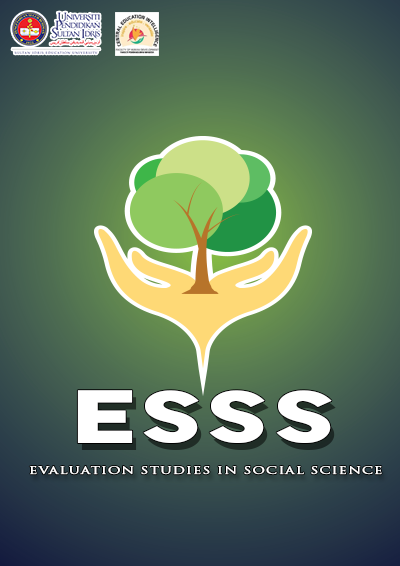Level of Study Motivation among Students in Two Schools at Hilir Perak District
Tahap Motivasi Belajar dalam Kalangan Murid di Dua Buah Sekolah di Daerah Hilir Perak
DOI:
https://doi.org/10.37134/esss.vol2.sp.10.2021Keywords:
Study motivation, school students, academic achievementAbstract
Excellent academic performance is necessary to ensure one's life in the future. There are various factors that contribute to the deterioration of students' academic performance including the students' own study motivation. A quantitative study; survey methods were conducted to assess the level of study motivation and its relationship with students’ academic performance. This study involved N=100 students from two District SJKT located in Hilir Perak (N = 50 SJKT 1; N = 50 SJKT II). Data were collected using a questionnaire and analyzed with the help of SPSS software version 25.0. The results of the analysis showed that students in both SJKT have a moderate level of study motivation with an average mean score obtained was ±2.88 – ±4.20. However, the analysis found that the level of student’s study motivation in SJKT I was higher (mean = 2.94-4.20) than the level of student’s study motivation in SJKT II (mean score = 2.04-4.34). The analysis results also showed that the students in both schools have a moderate level of academic achievement performance. However, this study found that the level of student’s study motivation in both schools did not have any significant relationship with their academic achievement (r = 0.087 (SJKT 1), r = -0.127 (SJKT II) whereby the value of p obtained was greater than 0.05. Finally, this study suggests that students' study motivation can be generated through the students themselves, family and support from the local community.
Downloads
References
Alias, R., & Hasril, M. (2014). Kajian gaya pembelajaran dan motivasi terhadap pencapaian pelajar diploma kejuruteraan di Politeknik. Kertas prosiding. Fakulti Pendidikan Teknikal dan Vokasional, Universiti Tun Hussein Onn Malaysia.
Becker, M., Mcelvany, N., & Kortenbruck, M. (2010). Intrinsic and extrinsic reading motivation as predictors of reading literacy: A longitudinal study. Journal of Educational Psychology, 102, 773–785.
Boon, Y., & Salamat, M.S. (2012). Budaya membaca dalam kalangan pelajar 4 SPH Program Khas Pensiswazahan Guru Universiti Teknologi Malaysia. https://docplayer.net/32897694-Budaya-membaca-dalam-kalangan-pelajar-pelajar-4-sph-program-khas-pensiswazahan-guru-universiti-teknologi-malaysia.html
Brook, R., Brooks, S. & Goldstein, S. (2012). The power of mindsets: Nurturing engagement, motivation, and resilience in student. In Christenson, L.S., Reschly, A.L., & Wylie, C. Handbook of research on student engagement, 541-562. New York: Springer.
Chemsi, G., Sadiq, M., Radid, M., & Talbi, M. (2019). Formative E-Assessment and Behavioral Commitment of Students: Case of the Faculty of Science Ben M’sik. International Journal of Emerging Technologies in Learning, 14(12): p4-14. https://online.journals.org/index.php/i jet/article/view/10389/5744
Chua, Y.P. (2014). Kaedah penyelidikan: Kaedah dan statistik penyelidikan. Kuala Lumpur: McGraw Hill Education.
Hamsari. N.A., & Yahaya, A. (2012). Peranan motivasi pembelajaran dan gaya keibubapaan dan sikap dengan pencapaian akademik. Journal of Educational Psychology and Counselling. 5, 30-57.
Heutte, J. (2017). The persistence of motivation and the experience of Flow: a reference framework for the study of e-learning. Paris, France.
Kasa, Z. (2013). Isu-isu pendidikan luar bandar di Perak. https://www.semanticscholar.org/paper/Isu-pendidikan-luar-bandar-di-Perak-Kasa-Dawi/
Krishnan, M. (2015). Penyesuaian, motivasi pencapaian dan pencapaian akademik pelajar di sebuah sekolah menengah. Kertas sarjana pendidikan. Universiti Pendidikan Sultan Idris.
Lam, S. F., Jimerson, S., Kikas, E. Cefai, C., Verga, F. H., Nelson, B., & et al. (2012). Do girls and boys perceive themselves as equally engaged in school? The result of an international study from 12 countries. Journal of School Psychology, 50(1), pp77-94.
Maalip, H., Yahaya, A., Ting Yin, K., Rathakrishnan, B., Maakip, I., Ahmad, I., & et al. (2020). Pembentukan modal insan: Hubungan konsep kendiri, personaliti, dan pencapaian akademik pelajar sekolah menengah. Southeast Asia Psychology Journal, 8(2), 103 – 122.
Mammadov, S.C., Tracy, L.W., & Thomas, J. (2018). The big five personality predictors of academic achievement in gifted students: mediation by self-regulatory efficacy and academic motivation. High Ability Studies, 29(2), 111- 133.
Mei, H.J., & Mohamad Yusuff, S.L (2011), Hubungan antara tahap motivasi dengan pencapaian akademik pelajar pendidikan jarak jauh. Universiti Sains Malaysia.
Mohd Yusoff, H., & Azman, N. (2018). Pencapaian akademik murid lelaki dan perempuan: Peranan sokongan pembelajaran dan keterlibatan murid. Malaysian Journal of Learning and Instruction, 15(2), 257-287.
Mulyaningsih, I.E. (2014). Pengaruh interaksi sosial keluarga, motivasi belajar, dan kemandirian belajar terhadap prestasi belajar. Jurnal Pendidikan dan Kebudayaan, 20(4).
Ngasiman, N. (2014). Kesan kaedah pembelajaran koperatif terhadap pencapaian pelajar dalam mata pelajaran matematik. Kertas Ijazah Sarjana Pendidikan Teknikal dan Vokasional.
Purwanto, N. (2011). Psikologi pendidikan. Bandung: PT. Remaja Rosdakarya
Royo, M.A., & Mahmood, H. (2011). Faktor-faktor kelemahan yang mempengaruhi pencapaian cemerlang dalam mata pelajaran reka cipta. Journal of Educational Psychology and Counseling, 2, 145-174.
Spinath, B., & Steinmayr, R. (2012). The roles of competence beliefs and goal orientations for change in intrinsic motivation. Journal of Educational Psychology, 104(4), 1135-1148. https://doi.org/10.1037/a0028115
Steinmayr, R., Meißner, A., Weidinger, A.F., & Wirthwein, L. (2014). Academic achievement. https://www.oxfordbibliographies.com.
Sunarsih, T. (2010). Hubungan antara motivasi belajar, kemandirian belajar dan bimbingan akademik terhadap prestasi belajar mahasiswa di Stikes A. Yani Yogyakarta: Yogyakarta.
Wang, M. T., & Eccles, J. S. (2012). Social support matters: Longitudinal effects of social support on three dimensions of school engagement from middle to high school. Child Development, 83(3), p877–895.
Yahaya, A., & Abdul Razak, S. (2010). Teori berkaitan gaya pembelajaran dan kaedah pengajaran.
Yusof, H., & Abdul Jalil, N. (2012). The relationship between family factors and motivation with academic achievement of felda students. Journal of Contemporary Issues and Thought, 2.





